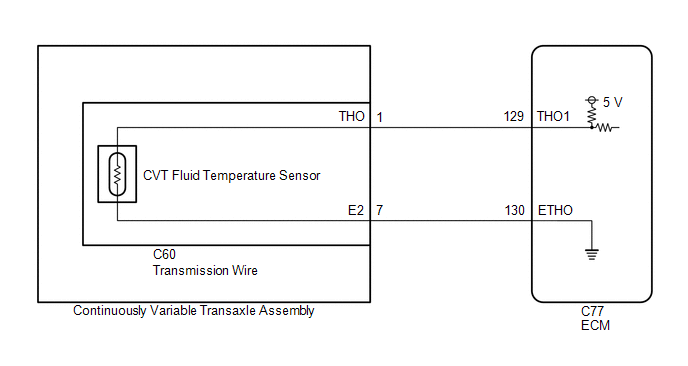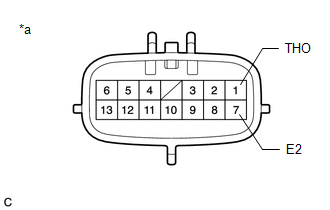- DTC judgment completed
- System normal
| Last Modified: 05-13-2024 | 6.11:8.1.0 | Doc ID: RM100000001GYSJ |
| Model Year Start: 2020 | Model: Corolla Hatchback | Prod Date Range: [01/2019 - 11/2022] |
| Title: K313 (CVT): CONTINUOUSLY VARIABLE TRANSAXLE SYSTEM: P0712,P0713; Transmission Fluid Temperature Sensor "A" Circuit Low Input; 2020 - 2023 MY Corolla Corolla Hatchback [01/2019 - 11/2022] | ||
|
DTC |
P0712 |
Transmission Fluid Temperature Sensor "A" Circuit Low Input |
|
DTC |
P0713 |
Transmission Fluid Temperature Sensor "A" Circuit High Input |
DESCRIPTION
The CVT fluid temperature sensor converts the fluid temperature into a resistance value which is detected by the ECM.
The sensor resistance changes with the CVT fluid temperature. As the temperature rises, the sensor resistance decreases. The ECM applies voltage to the temperature sensor through ECM terminal THO1 and calculates the CVT fluid temperature based on the voltage signal.
HINT:
The CVT fluid temperature is likely to increase under conditions such as towing, climbing hills and in traffic.
|
DTC No. |
Detection Item |
DTC Detection Condition |
Trouble Area |
MIL |
Memory |
|---|---|---|---|---|---|
|
P0712 |
Transmission Fluid Temperature Sensor "A" Circuit Low Input |
When the battery voltage is 8 V or more and the ignition switch is ON, there is a short in the CVT fluid temperature sensor circuit for 0.5 seconds. (1-trip detection logic) |
|
Comes on |
DTC stored |
|
P0713 |
Transmission Fluid Temperature Sensor "A" Circuit High Input |
There is an open in the CVT fluid temperature sensor circuit for 0.5 seconds when either of the following conditions is met (1-trip detection logic):
|
|
Comes on |
DTC stored |
DTC Detection Condition Patterns (P0713):
|
Vehicle Condition |
|||
|---|---|---|---|
|
Pattern 1 |
Pattern 2 |
||
|
Diagnostic Condition |
600 seconds or more have elapsed since engine start (engine coolant temperature and intake air temperature were -29.375°C (-20.875°F) or less at engine start). |
○ |
- |
|
10 seconds or more have elapsed since engine start (engine coolant temperature and intake air temperature were higher than -29.375°C (-20.875°F) at engine start). |
- |
○ |
|
|
Malfunction Condition |
There is an open in the CVT fluid temperature sensor circuit. |
○ |
○ |
|
Duration |
0.5 seconds or more |
0.5 seconds or more |
|
|
Detection Logic |
1-trip detection logic |
1-trip detection logic |
|
HINT:
This DTC is stored when either of the above detection patterns is met.
MONITOR DESCRIPTION
The CVT fluid temperature sensor converts the CVT fluid temperature to an electrical resistance value. Based on the resistance, the ECM determines the CVT fluid temperature and can detect an open or short in the CVT fluid temperature circuit. If the resistance value of the CVT fluid temperature is less than 79 Ω*1 or more than 156 kΩ*2, the ECM interprets this as a malfunction of the CVT fluid temperature sensor or wiring, illuminates the MIL and stores a DTC.
*1: 150°C (302°F) or more is indicated regardless of the actual CVT fluid temperature.
*2: -40°C (-40°F) is indicated regardless of the actual CVT fluid temperature.
HINT:
The CVT fluid temperature can be checked in the Data List.
MONITOR STRATEGY
|
Related DTCs |
P0712: CVT fluid temperature sensor / Range check (Low voltage) P0713: CVT fluid temperature sensor / Range check (High voltage) |
|
Required sensors/Components |
Continuously variable transaxle assembly (CVT fluid temperature sensor) |
|
Frequency of operation |
Continuous |
|
Duration |
0.5 seconds |
|
MIL operation |
Immediately |
|
Sequence of operation |
None |
TYPICAL ENABLING CONDITIONS
All
|
Battery voltage |
8 V or more |
|
Time after battery voltage is 8 V or more |
0.5 seconds or more |
|
Write inhibit |
Permit |
|
Time after write status forbiddance to permit |
0.5 seconds or more |
|
Ignition switch |
ON |
|
Time after ignition switch OFF to ON |
0.5 seconds or more |
|
Starter |
OFF |
|
Time after starter ON to OFF |
0.5 seconds or more |
P0712:
|
The monitor will run whenever the following DTCs are not present. |
None |
P0713 Condition (A):
|
Engine coolant temperature (ECT) or intake air temperature (IAT) at engine start. |
-29.375°C (-20.875°F) or less |
|
Time after engine start |
10 minutes |
|
ECT (Engine coolant temperature) sensor circuit fail (P0115, P0117, P0118) (Pending + MIL) |
Not detected |
|
IAT (Intake air temperature) sensor circuit fail (P00AC, P00AD, P0110, P0112, P0113) (Pending + MIL) |
Not detected |
P0713 Condition (B):
|
Engine coolant temperature (ECT) or intake air temperature (IAT) at engine start. |
More than -29.375°C (-20.875°F) |
|
Time after engine start |
10 seconds |
|
ECT (Engine coolant temperature) sensor circuit fail (P0115, P0117, P0118) (Pending + MIL) |
Not detected |
|
IAT (Intake air temperature) sensor circuit fail (P00AC, P00AD, P0110, P0112, P0113) (Pending + MIL) |
Not detected |
TYPICAL MALFUNCTION THRESHOLDS
P0712:
|
CVT fluid temperature sensor voltage CVT fluid temperature sensor output temperature) |
Less than 0.14 V (More than 164°C (327.2°F)) |
P0713:
|
CVT fluid temperature sensor voltage CVT fluid temperature sensor output temperature) |
More than 4.91 V (Less than -48°C (-54.4°F) |
COMPONENT OPERATING RANGE
|
CVT fluid temperature sensor voltage CVT fluid temperature sensor output temperature) |
0.14 to 4.91 V (-48 to 164°C (-54.4 to 327.2°F) |
CONFIRMATION DRIVING PATTERN
HINT:
- Connect the Techstream to the DLC3.
- Turn the ignition switch to ON and turn the Techstream on.
- Clear the DTCs (even if no DTCs are stored, perform the clear DTC procedure).
- Turn the ignition switch off and wait for 2 minutes or more.
- Turn the ignition switch to ON and turn the Techstream on.
- Start the engine.
-
Wait for 10 minutes or more with the engine running. [*1]
HINT:
[*1]: Normal judgment procedure.
The normal judgment procedure is used to complete DTC judgment and also used when clearing permanent DTCs.
- Enter the following menus: Powertrain / Engine and ECT / Utility / All Readiness.
- Input the DTC: P0712 or P0713.
-
Check the DTC judgment result.
Techstream Display
Description
NORMAL
ABNORMAL
- DTC judgment completed
- System abnormal
INCOMPLETE
- DTC judgment not completed
- Perform driving pattern after confirming DTC enabling conditions
N/A
- Unable to perform DTC judgment
- Number of DTCs which do not fulfill DTC preconditions has reached ECU memory limit
HINT:
- If the judgment result shows NORMAL, the system is normal.
- If the judgment result shows ABNORMAL, the system has a malfunction.
- If the judgment result shows INCOMPLETE or N/A, perform the normal judgment procedure again.
WIRING DIAGRAM

CAUTION / NOTICE / HINT
NOTICE:
PROCEDURE
|
1. |
READ VALUE USING TECHSTREAM (A/T OIL TEMPERATURE 1) |
(a) Warm up the engine.
(b) Connect the Techstream to the DLC3.
(c) Turn the ignition switch to ON.
(d) Turn the Techstream on.
(e) Enter the following menus: Powertrain / Engine and ECT / Data List.
(f) According to the display on the Techstream, read the Data List.
Powertrain > Engine and ECT > Data List
|
Tester Display |
Measurement Item |
Range |
Normal Condition |
Diagnostic Note |
|---|---|---|---|---|
|
A/T Oil Temperature 1 |
CVT fluid temperature sensor value |
Min.: -40°C (-40°F) Max.: 150°C (302°F) |
|
If the value is -40°C (-40°F) or 150°C (302°F) or more, the CVT fluid temperature sensor circuit is open or shorted. |
Powertrain > Engine and ECT > Data List
|
Tester Display |
|---|
|
A/T Oil Temperature 1 |
|
Result |
Proceed to |
|---|---|
|
Data List value is not normal |
A |
|
Data List value is normal |
B |
| B |

|
|
|
2. |
INSPECT TRANSMISSION WIRE (CVT FLUID TEMPERATURE SENSOR) |
|
(a) Disconnect the C60 transmission wire connector. |
|
(b) Measure the resistance according to the value(s) in the table below.
Standard Resistance:
|
Tester Connection |
Condition |
Specified Condition |
|---|---|---|
|
1 (THO) - 7 (E2) |
Always |
79 Ω to 156 kΩ |
|
1 (THO) - Body ground and other terminals |
Always |
10 kΩ or higher |
|
7 (E2) - Body ground and other terminals |
Always |
10 kΩ or higher |
HINT:
If the resistance is out of the specified range at any of the CVT fluid temperatures shown in the table below, the driveability of the vehicle may decrease.
|
CVT Fluid Temperature |
Specified Condition |
|---|---|
|
10°C (50°F) |
5.6 to 7.3 kΩ |
|
25°C (77°F) |
3.5 kΩ |
|
110°C (230°F) |
0.22 to 0.27 kΩ |
(c) Connect the C60 transmission wire connector.
| NG |

|
|
|
3. |
CHECK HARNESS AND CONNECTOR (TRANSMISSION WIRE - ECM) |
(a) Disconnect the C77 ECM connector.
(b) Measure the resistance according to the value(s) in the table below.
Standard Resistance:
|
Tester Connection |
Condition |
Specified Condition |
|---|---|---|
|
C77-129 (THO1) - C77-130 (ETHO) |
Always |
79 Ω to 156 kΩ |
|
C77-129 (THO1) - Body ground and other terminals |
Always |
10 kΩ or higher |
|
C77-130 (ETHO) - Body ground and other terminals |
Always |
10 kΩ or higher |
(c) Connect the C77 ECM connector.
| NG |

|
REPAIR OR REPLACE HARNESS OR CONNECTOR (TRANSMISSION WIRE - ECM) |
|
|
4. |
REPLACE ECM |
(a) Replace the ECM.
| NEXT |

|
|
5. |
REPLACE CONTINUOUSLY VARIABLE TRANSAXLE ASSEMBLY |
(a) Replace the continuously variable transaxle assembly.
| NEXT |

|
|
6. |
REPLACE ECM |
(a) Replace the ECM.
| NEXT |

|
|
|
|
![2020 - 2023 MY Corolla Corolla Hatchback [01/2019 - 11/2022]; K313 (CVT): CONTINUOUSLY VARIABLE TRANSAXLE SYSTEM: DTC CHECK / CLEAR](/t3Portal/stylegraphics/info.gif)

